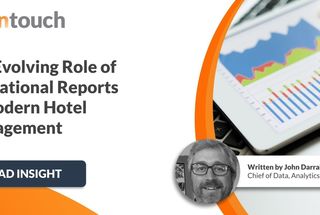The Evolving Role of Operational Reports in Modern Hotel Management

In the hospitality industry, operational reports delivered through Property Management Systems (PMS) are critical for running a smooth hotel operation. These reports form the backbone of daily operations, guiding decisions on staffing, room cleaning schedules and room revenue optimization. Furthermore, they play a crucial role in ensuring regulatory compliance. More complex hotel operations integrate these reports into third-party systems for specialized tasks such as rate optimization or accounting. The need for robust operational reports remains steadfast, even as technology advances and hotel executives increasingly demand enhanced analytics capabilities.
Above Property Reporting: A Holistic View of Hotel Portfolios
Multi-property hotel chains must have a holistic view of performance across all their properties. This comprehensive perspective facilitates several key optimizations. Analyzing occupancy trends across multiple locations makes inventory optimization significantly more efficient. By understanding these patterns, chains can better manage room inventory, ensuring availability aligns with demand and reducing unnecessary costs. Centralized reporting also allows for more efficient staff allocation. By identifying peak times and seasonal variations, hotels can schedule the right number of employees at the right times, enhancing service quality and operational efficiency. Additionally, with a clear view of procurement needs and vendor performance across properties, hotels can negotiate better terms and ensure timely delivery of essential supplies, optimizing vendor contracts. Centralized data also enables dynamic pricing strategies, allowing hotels to optimize room rates based on demand, competition and other market factors, ultimately maximizing revenue.
Self-Directed Analytics: Empowering Hotel Executives
Today’s hotel executives seek more than pre-defined reports; they want the power to explore data independently. They desire self-directed analytics, including the ability to use spreadsheets and pivot tables connected to real-time hotel data. The flexibility of spreadsheets allows executives to create custom analyses and reports tailored to their specific needs. Additionally, merging data from various domains—such as finance, operations and customer feedback—provides a more comprehensive understanding of business performance. This capability enables executives to uncover insights that drive strategic decisions by combining business domains in novel ways. Advanced analytics capabilities also allow for more complex analysis, empowering executives to drill down into specific business functions and gain deeper insights that inform their strategies.
Data Freedom: Breaking Down Silos
Data silos have long been a challenge in the hospitality industry, hindering comprehensive analysis and decision-making. Modern cloud PMS solutions are addressing this issue by providing greater freedom to access and share data. Integrating data from different sources within the hotel ecosystem ensures that information flows seamlessly, providing a unified view of operations. This breakdown of silos facilitates more comprehensive analysis and better-informed decision-making. API-driven solutions further enhance this capability by allowing hotels to move data from the PMS and combine it with other systems. This enables hotels to perform more extensive and integrated analyses, combining diverse datasets for richer insights. Moreover, hotels can subscribe to data change streams, enabling real-time updates and the ability to replay changes, ensuring that analytics are always based on the most current information.
The Role of AI in Hotel Management
Artificial Intelligence (AI) is becoming a pivotal element in modern hotel management, enhancing various aspects of operations. AI-driven rate optimization is a prime example, where AI algorithms analyze vast amounts of data to determine optimal pricing strategies. These algorithms can dynamically adjust rates based on demand, competition, and other market factors, maximizing revenue. AI also plays a crucial role in attribute-based selling (ABS) for hotel rooms. By leveraging AI, hotels can analyze guest preferences and behaviors to highlight and price individual room attributes—such as view, floor level, and amenities—allowing for personalized offerings. This approach increases guest satisfaction and boosts revenue by enabling hotels to charge premiums for desirable attributes.
Embracing the Future of Hotel Management
Operational reports delivered through PMS technology serve as a cornerstone of hotel management, crucial for daily operations, regulatory compliance and strategic decision-making. As hotels adopt more modern and cloud systems, the demand for advanced analytics capabilities grows. Above-property reporting, self-directed analytics and data freedom transform how hotel executives manage their portfolios, breaking down data silos and providing deeper insights. Furthermore, the integration of AI is set to revolutionize the industry, offering sophisticated tools for rate optimization and internal QA. The future of hotel management lies in seamlessly integrating these technologies, empowering executives with the data and tools they need to thrive in an increasingly competitive market.
About Stayntouch
Stayntouch delivers a full-featured and Best-in-Class cloud property management system (PMS) with a comprehensive library of over 1,200 best-in-class integrations. Our cloud-native PMS empowers hotels to drive revenue, reduce costs, enhance service, and captivate their guests. Stayntouch's newly expanded PMS platform, Stayntouch 2.0, further simplifies hotel operations, allowing hotels to streamline and accelerate direct bookings, process payments easily, and simplify integrations - offering an even more enhanced guest experience. Stayntouch is supported by a team of professionals with deep roots in the hospitality industry and is a trusted partner to industry-leading management companies including Sage Hospitality, HEI Hotels & Resorts, EOS Hospitality, and Stoney Creek Hotels, innovative independent brands such as Village Hotels, Pod Hotels, and First Hotels, and iconic independent properties such as the TWA Hotel and Zoku Amsterdam. For more information, visit www.stayntouch.com.
Elliott Mest
MFC PR
Stayntouch